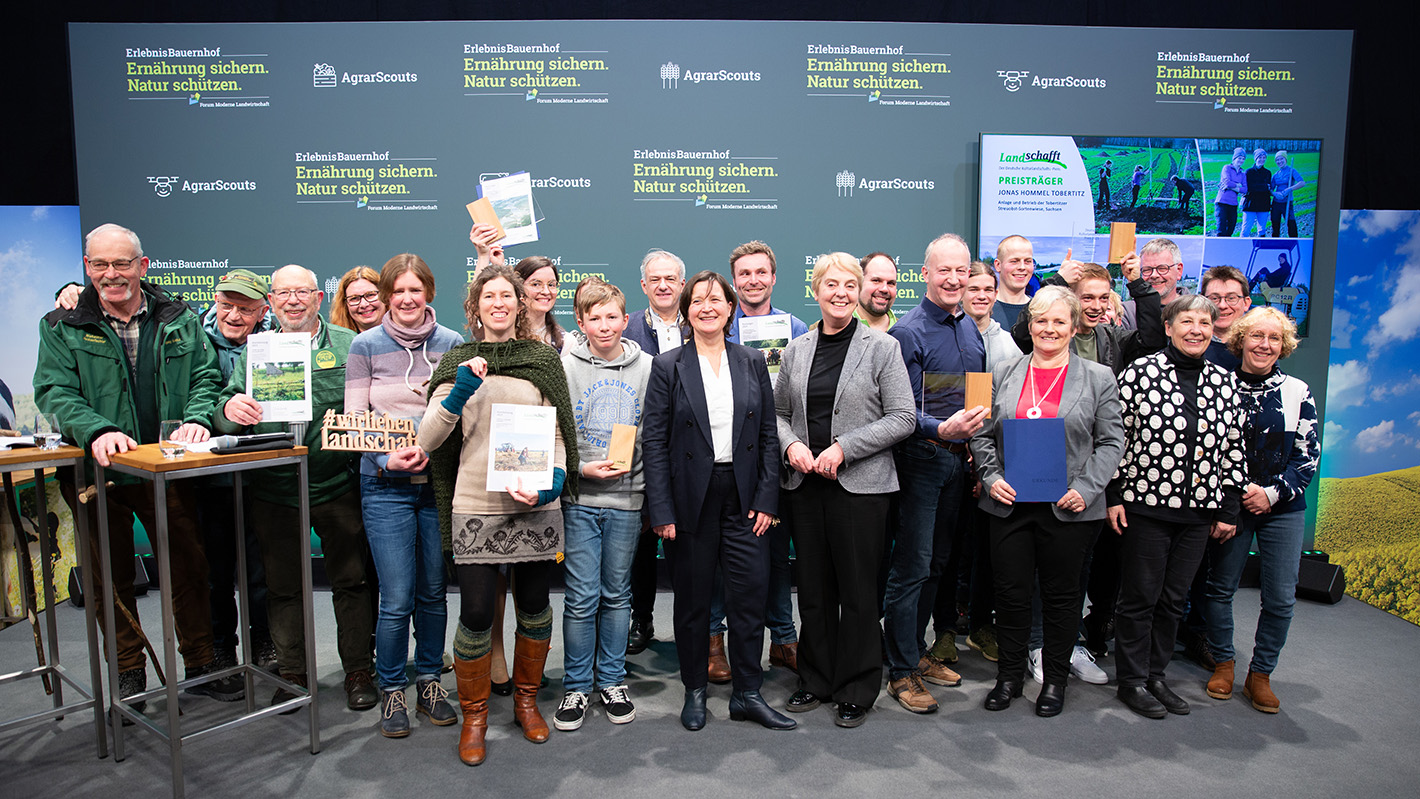22.01.2024
Creative ideas and civic engagement preserve the rural cultural landscape and ensure attractive rural areas

Contact person
Gabriele Blömker
02501 801-1670
gabriele.bloemker@lv.de

Applicants for the German Cultural Landscape Award
The preservation and maintenance of traditional pond farming in the district of Tirschenreuth (Bavaria), the planting and operation of a meadow orchard in Tobertitz (Vogtland district, Saxony) and the conversion of the old town hall and its further development into a community meeting place in Kembach (Main-Tauber district, Baden-Württemberg) and the reconstruction of a suckler cow and landscape conservation farm with public relations work in Lippoldshausen (Göttingen district, Lower Saxony) - these are the four winners of the German Cultural Landscape Award, presented for the first time by the German Cultural Landscape Foundation (DSK) in Berlin. The prizes were presented today by Susanne Schulze Bockeloh, Chair of the Board of the German Cultural Landscape Foundation, and Gisela Reetz, Saxon State Secretary in the State Ministry for Energy, Climate Protection, Environment and Agriculture, on the stage of the Adventure Farm at the Green Week in Berlin.
A total of 61 projects supported by individual applicants or clubs and associations from all over Germany have applied for the German Cultural Landscape Award. „We received wonderful applications from all over Germany, which clearly show how committed landscape conservation and citizens' associations, nature conservation and agricultural associations, as well as individual farmers, are to preserving the cultural landscape,“ says Susanne Schulze Bockeloh, Managing Director of the German Cultural Landscape Foundation, drawing a very positive balance of the first-ever competition.„The projects also show that nature and environmental protection, the preservation of the cultural landscape and economic use can be reconciled.This is sustainability in action,“ said State Secretary Gisela Reetz.„It was therefore not easy for the jury to identify the best from the many first-class applications,“ emphasizes Susanne Schulze Bockeloh. In the end, seven projects were awarded prizes: four main prizes and three commendations.
„It was therefore not easy for the jury to identify the best from the many first-class applications,“ emphasizes Susanne Schulze Bockeloh. In the end, seven projects were awarded prizes: four main prizes and three commendations.
Main prizes
Preservation and maintenance of traditional pond farming in the district of Tirschenreuth (Bavaria)
- Applicant: ARGE Fisch im Landkreis Tirschenreuth e.V., association for the promotion of traditional pond farming
- Prize money: 2.500 €
5,000 ponds have characterized the Tirschenreuth cultural landscape for around a thousand years. They are still used by fishermen in the region to breed carp. In the past, they were also used as cattle watering places, washing places, fire-fighting water reservoirs and part of the town fortifications. This has created a unique, species-rich cultural landscape that provides a special habitat for countless protected and rare animal and plant species.
Fishermen, chefs, tourism managers and conservationists have joined forces in ARGE Fisch e.V. to preserve this cultural landscape through a holistic concept and to raise awareness of this special landscape among locals and tourists alike. In this way, the cultural landscape is preserved through an economically viable management concept.
Planting and operation of the Tobertitz orchard (Vogtlandkreis, Saxony)
- Applicant: Jonas Hommel, farmer
- Prize money: 2.500 €
Twenty-two-year-old Jonas Hommel has created a genetic backup site for the 115 most endangered fruit varieties in Saxony. His aim is to safeguard the diversity of fruit varieties in Saxony and thus increase biodiversity. To this end, he has subdivided a 35-hectare field and developed 3 hectares of it into a special orchard meadow with a footpath and a fruit hedge to prevent erosion. Beekeeping and a grazing concept round off the concept.
The young farmer processes the harvest into apple juice, which he markets regionally. He has since qualified as a fruit tree warden and runs the farm as a full-time business.
The orchard has now developed into the Vogtland Orchard Competence Center. To this end, Hommel will equip a vacant farm with a cidery, a distillery, an event barn as well as vacation apartments and caravan pitches, thus creating new jobs.
Conversion of the old Kembach town hall and establishment of a new community meeting place (Main-Tauber district, Baden-Württemberg)
- Applicant: Citizens' association Kembach 2018 e.V.
- Prize money: € 2,500
The old town hall in Kembach (town of Wertheim, Main-Tauber district, Baden-Württemberg), a landmark building whose oldest part was built in 1790, has been renovated and put to new use by the committed citizens of the town over the course of three years of voluntary work.
The building is now used by the church for services and other church activities, by the municipal administration for council meetings and by citizens as a meeting place for a variety of activities. A publicly accessible toilet has also been installed.
What makes this project special is the breadth and intensity of the village community. Almost all citizens of the village, from eight years old to 82 years old, were active within their means. The three years of joint work have welded the village together. The new village center holds the village together.
Development of a farm that combines agriculture, landscape conservation and public relations work in an exemplary manner (Lippoldshausen, Göttingen district, Lower Saxony)
- Applicant: Denis Schmahl, farmer
- Prize money: € 2,500
In 1994, the then 22-year-old Denis Schmahl revived his grandparents' farm in Lippoldshausen (Göttingen district) with one cow. Over the past 22 years, the hobby farm has grown from four hectares to a full-time farm with 90 hectares and almost 100 animals.
With his suckler cows, goats, sheep and pigs, Denis Schmahl has been involved in contract nature conservation since 2008. He manages extensive grassland areas and orchards on behalf of the landscape conservation association. He also breeds old domestic animal breeds that are threatened with extinction (e.g. old red and white cattle, Angler saddle pigs and Bentheimer pigs).
The business is profitable and growing. Schmahl now employs several people. The aim is to keep the farm economically viable and attractive for future generations. The founder of the farm is intensively involved in public relations work. Nursery and school children learn about the connections between agriculture and nature conservation in a playful way on the farm using practical examples.
Recognitions
Initiative „Landschaft anpacken“ - practical landscape conservation training: Join in and get stuck in! (Middle Franconia, Bavaria)
- Applicant: Landschaftspflegeverband Mittelfranken e.V.
The Landschaftspflegeverband Mittelfranken offers training courses in which interested and committed citizens learn how to preserve valuable landscapes. They clear rough grassland of shrubs, maintain hedges, mow wet meadows for orchids and butterflies, plant orchards, hedges and trees, and try out the use of machines. The program also includes topics such as occupational safety and tax aspects of landscape conservation.
Creation, preservation and utilization of orchard meadows in the Kleve district (North Rhine-Westphalia)
- Applicant: Landschaftspflege im Kreis Kleve e.V.
The association with its 380 members preserves orchards on a large scale in the Kleve district and also creates new ones. To date, 20,000 fruit trees have been planted. The areas are grazed by cattle and sheep. The fruit is marketed fresh via cooperation partners, processed into juice using mobile presses or distilled. In recent years, the landscape conservation association has also started to grow fruit trees. The population is involved through fruit tree pruning courses and information boards.
Preservation of the Nieheim braided hedges and preservation of the centuries-old cultural technique of hedge braiding (Höxter district, North Rhine-Westphalia)
- Applicant: Working group Nieheimer Flechthecken im Heimatverein Nieheim e.V.
The working group is committed to the preservation of Nieheim's braided hedges. The voluntary commitment aims to promote hedges in Westphalia for biodiversity, climate, identity and sustainable landscape design. In Nieheim and the surrounding area, the skill of hedge braiding is a regional specialty. The working group sensitizes interested and committed people to the careful treatment of nature and at the same time ensures that the centuries-old cultural technique of hedge weaving is not lost.
The Stiftung Landwirtschaftsverlag has organized this competition on behalf of the Deutsche Stiftung Kulturlandschaft, Berlin.
Contact for your queries:
Gabriele Blömker
Stiftung Landwirtschaftsverlag Münster
Hülsebrockstr. 2–8, 48165 Münster
+49 0250 1801-1670gabriele.bloemker@lv.de
www.stiftung-lv-muenster.de
Photos for illustration: deutscher-kulturlandschafts-preis.de/download/Fotos.zip
Photos for illustration: LV-Stiftung